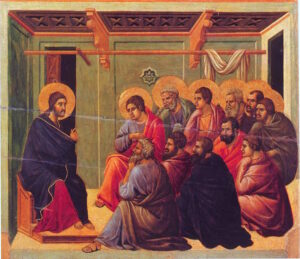Fr Neil’s homily on the Seventh Sunday of Easter, 29 May 2022 — the Sunday after Ascension
The glory which you have given me I have given to them, that they may be one even as we are one, I in them and you in me.¹
Here in the gospel John gives us a glimpse into the priestly prayer of Christ. It is the prayer he prays as he knows that he heads towards Calvary. Christ prays for his disciples and those who will come after them — you and me.
What he reveals in this prayer is the desire that his disciples might come to dwell in unity. Unity within a family, amongst friends and within a community is a precious thing that allows the individuals within that group to flourish and grow. However, unity is a fragile reality and we see all too often the damage done when family, marriages, friends and communities fall apart in divisive disunity.
The Fall speaks to this experience, both of longing for unity and the profound destructive reality of alienation and fragmentation on the stability of the self. Left to our own devices we so often find ourselves and others seeking to force people into a “unity” of thought, being and purpose that is actually our own. This desire to compel others into a forced unity reveals a will to shape others into our image and likeness. The rather cack-handed and spiteful attempt to crush the Latin mass recently seems a prime example.
Christ reveals that only in God can we find the true unity that we seek and long for. It is a unity that is only perfectly experienced in the Godhead itself, as Christ’s desire is “that they all may be one; even as you, Father, are in me and I in you, that they may be in us.”²
In the book of Revelation Christ reveals that “I am the Alpha and Omega, the first and the last, the beginning and the end.”³ And St Paul in Acts 17:28 states that “in him we live and move and have our being.”
Christ alone has the capacity to unite what is separated. For in him heaven and earth, human and divine, are held together in perfect unity. Therefore in him there is no Jew or Greek, slave or free, male or female, old or young, tall or short, rich or poor, diversity of nationality or colour of our skin: all are made one in Christ.
Christ then is the only true source of unity and apart from him, our fragmentation deepens. We see this as society: families and individuals fall apart in pain, chaos, and destruction. It begins to become a dark, narcissistic, living hell for the individuals involved. At this moment in time, much of our modern society seeks to use our differences to separate us even more and our loss of identity in Christ has led to the rise of identity politics.
True unity is not something that we can obtain by our own efforts, by forcing people into conformity to a particular ideology. Even within the Church divisions are rooted in the greatest blasphemy of many trying to conform Christ, scripture and holy tradition to our own desires. Real unity comes about as the fruit of our focus, devotion and ongoing conversion to the likeness of Christ.
It is our unity in Christ that is the greatest witness of the gospel to the world, “so that the world may know that you have sent me and that I have loved them even as you have loved me.”⁴ The Latin Church in the West is rather lacking on that score with ever-deepening divisions within the body of Christ.
True unity can only become a reality when something outside of ourselves unites our common cause and direction. Given the breadth of our diversity it requires an objective eternal reality to unite us, or we will fall prey to petty divisions which are all to obvious today.
Christ states that only in him can true unity be held together as it reflects the perfect unity of the Godhead: Father Son and Holy Spirit — three persons, yet one God. Our prayer, worship and mission will only ever be authentic when it is directed to his revealed will and likeness.
Without the submitting of ourselves to the revelation of God in Christ, our prayer and mission will only be a sad reflection of ourselves which will attract no-one and lead to ever great divisions.
It is only in Christ alone that our rich diversity can be fruitful for the body as a whole and reflect the wonder and glory of the gospel to a world that is in dire need of eternal life and salvation.
¹ John 17:22–23
² John 17:21
³ Revelation 22:13
⁴ John 17:23








 Posts
Posts